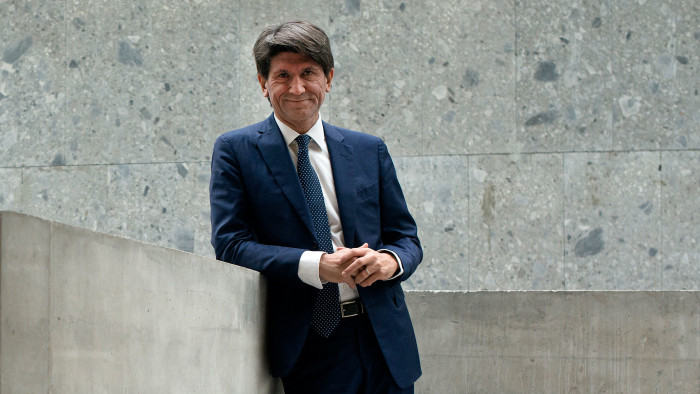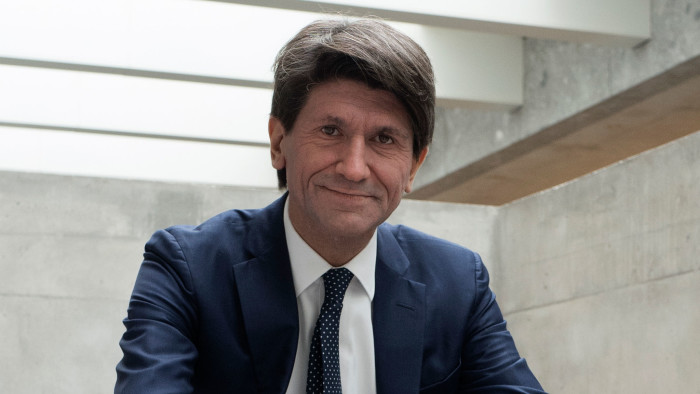Bocconi chief’s plans for Italy’s best-connected business school

Roula Khalaf, Editor of the FT, selects her favourite stories in this weekly newsletter.
This March, at Bocconi University in Milan, Gucci chief executive Marco Bizzarri gave a group of management students a personal account of one of the biggest stories in the luxury industry in recent times: his turnaround of the famous Kering-owned brand.
In the front row was Gianmario Verona, Bocconi’s professor of management and former chair in market innovation, who last month became rector of the university, one of the leading institutions in Italy.
For Verona, 46, this kind of high-level event is quite normal at Bocconi. Founded in 1902 by an entrepreneur as a business school and school of economics, the private university has ties to the country’s business, economic and political elite.
“Family firms, particularly mid-sized firms, have always been connected with our business school and [we do] a lot of learning with them. This is part of our historical legacy,” he says, speaking in his office, where the desk can barely be seen for piles of books.
But in changing times, with the internet disrupting traditional industries and education, Verona is keen to introduce “a series of innovations that give us additional energy”.
Central to these is a plan to make more of Bocconi’s combination of a business school and economics school, creating an interdisciplinary mix better able to generate innovations in a turbulent world and make the university more relevant internationally.
“You have here economists who speak to political scientists. People in information management who speak to economists, people in computer science who speak to people in marketing. This is crucial for the future,” he says.
“What is needed today are people who understand big data. That comes from not a traditional computer scientist or a marketing person. We need people who have been exposed to both things. This is where we are better than others,” adds the new rector, a former dean of the faculty who began his two-year renewable tenure on November 1.
In Italy, Bocconi’s credentials are second to none in its academic sphere. Alumni include many of Italy’s ruling class. Vodafone chief executive Vittorio Colao and JPMorgan Europe chairman and former finance minister Vittorio Grilli are Bocconi graduates. Former European commissioner and technocratic prime minister Mario Monti is Bocconi’s president. Stefano Sassi, chief executive of fashion brand Valentino, was last month named the university’s alumnus of the year.
Just before the interview, Tommaso Nannicini, under-secretary of state to prime minister Matteo Renzi and a Bocconi professor, was to be seen standing in the courtyard of the university’s main building.
Massimo Della Ragione, co-head of Goldman Sachs in Italy and another Bocconi graduate, argues that “the peculiarity of Bocconi in the Italian market is that it is very probably the only university for economics and finance with an academic programme aligned to professional market requirements”.
Della Ragione, a mergers and acquisitions specialist who holds classes on investment banking on Bocconi’s MSc programme, says the vast majority of Italians working at Goldman Sachs are Bocconi alumni.
The employment rate for MSc graduates is 94.3 per cent one year after graduation, but as competition among the world’s top schools has become borderless, another of Verona’s priorities is to stress Bocconi’s internationalisation. The university has found offering courses in English is not enough. More students demand international exposure too.
To this end, Bocconi is giving many students the chance to study in another country for at least one semester. Bocconi has 259 agreements with universities, including Yale, Princeton, Cornell and the University of Chicago in the US. It is also expanding its so-called hybrid programmes, which offer double degrees. Bocconi offers 26 double-degree programmes, on which students spend a year at Bocconi and a year at a partner institution — in China, for example. They graduate with two degrees.
CV

1970 Born in Milan, Italy
1994 Graduated with a business administration degree from Bocconi
1997-98 Research associate at Sloan School of Management, MIT
1999 Obtained his PhD in management at Bocconi
2007-13 Visiting professor at Tuck School of Business, Dartmouth College
2008 Became full professor at Bocconi. His main research interests are in strategic management of technology, innovation strategies and intellectual property rights
2008-10 Director of the PhD programme, Bocconi
2011-13 Director of the MBA programme at SDA Bocconi School of Management
2014-16 Dean of faculty at Bocconi
November 2016-present Rector of Bocconi
Verona sees Milan itself as another lure for students and faculty. The city, Italy’s capital of business, finance, fashion and food, has been cleaned up in the past five years, especially in preparation for it to host Expo 2015.
“Milan to me is a value proposition for people who want to come to Europe. There is a high standard of living in terms of quality of life, the cost . . . is not as high as Zürich or London,” he says.
There are 180,000 students across several universities in Milan, a city with a population of 1.3m. For Verona, the student density is analogous with Boston, where he lived in the 1990s as a visiting scholar at Sloan School of Management at Massachusetts Institute of Technology. He sees this as an attraction for students and teaching staff, one he says will increase when Bocconi opens a campus in 2018 that will raise the number of dorm rooms from 1,760 to nearly 2,100. Another “major opportunity for continental Europe’s top schools” is offered by the UK’s decision to leave the EU, he says.
On day-to-day business, he muses on the challenge all universities face in teaching a generation that has grown up with the internet and sees the smartphone as an extension of the arm — and brain. “We have to find a way to engage them better,” he says, adding that he has got used to students looking at their smartphones or laptops continuously while he is teaching them.
“I used to have a rule in my classes of no computers. Then I realised it was anachronistic. But their attention is very widespread; they are expert on everything and nothing, so you have to drag their attention to tell them what to do, where to go and how to surf,” he says.
Comments